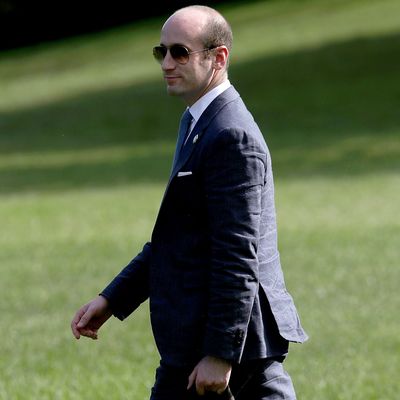
In a long-proposed and highly controversial policy change sure to attract a host of lawsuits, the Trump administration is moving ahead with a proposed new regulation expanding restrictions on federally funded cash benefits for large groups of legal immigrants to include non-cash benefits like food stamps, health-care benefits, and housing assistance. The new “public charge” rule (a reference to the empowerment of immigration officials to bar otherwise legal immigrants’ visas or green cards if they are likely to become a “public charge” dependent on government benefits) is apparently the apple of Trump policy adviser Stephen Miller’s eye, central to the administration’s strategy of reducing legal as well as illegal immigration. The New York Times explained the new policy when it was first proposed last September:
Trump administration officials announced Saturday that immigrants who legally use public benefits like food assistance and Section 8 housing vouchers could be denied green cards under new rules aimed at keeping out people the administration deems a drain on the country.
The move could force millions of poor immigrants who rely on public assistance for food and shelter to make a difficult choice between accepting financial help and seeking a green card to live and work legally in the United States.
Older immigrants, many of whom get low-cost prescription drugs through the Medicare Part D program, could also be forced to stop participating in the popular benefits program or risk being deemed a “public charge” who is ineligible for legal resident status.
Aside from expanding the scope of benefits that can lead to a rejected visa or green-card application, the new rule would redefine the amount of public assistance that would trigger the “public charge” label from half of total income to a flat amount representing 15 percent of the federal poverty line, or, at current levels, $1,821. So we’re not talking about a lot of assistance. And since quite a few legal immigrants affected by the rule have children born in this country, it will affect citizens as well.
As CNN notes, long before the rule became official, it began having a chilling effect on participation in non-cash public-assistance programs:
Monday’s regulation is likely to meet legal challenges, but it could still cause some who fear retribution to alter their daily lives.
About one in seven adults in immigrant families reported that either the person or a family member did not participate in a non-cash safety net program last year because of fear of risking his or her green card status in the future, an Urban Institute study found.
Among low-income immigrant families, the figure was more than one in five, according to the study, which was based on a December 2018 survey of nearly 2,000 non-elderly adults who are foreign born or live with at least one foreign-born family member.
That’s the whole idea, of course, and part of the Trump administration’s overall strategy of making life as miserable as possible for immigrants regardless of status. It’s also why the administration’s claim that the new rule will affect 383,000 people is a low estimate: The fear factor will increase its scope. The change will be rationalized, of course, as an effort to ensure that shiftless people don’t enter the U.S. to live off our generous (so generous that we have eliminated income inequality, right?) welfare state: a message that is spicy red meat for Trump’s MAGA electoral base.
There’s a broader difference of perspective this approach reflects: between those who believe public assistance, especially of the non-cash variety, is a good in itself in terms of its impact on public health and economic opportunity, and those who view this safety net as inherently corrosive of individual initiative and a form of redistribution of the hard-earned resources of U.S. citizens toward the undeserving poor, immigrant or native. So it is kind of a nice racist twofer in its appeal to the culturally resentful who would like to eliminate “welfare” — and for that matter immigration — altogether.
Team Trump isn’t going to admit that, obviously, as reflected in this hilarious line from Ken Cuccinelli, the right-wing politician supervising the legal-immigration system in an “acting” role because there’s no way the Senate would confirm him:
And if Americans had enslaved green people back in the day, we’d have no Black Lives Matters movement, amirite?
The new “public charge” rule will take effect on October 15, in the unlikely event it’s not held up by the judiciary.






























